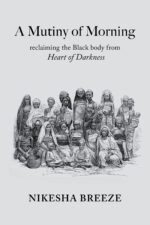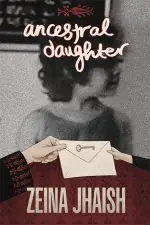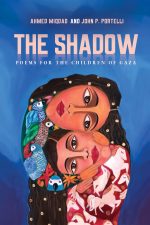Lababidi’s Palestine Wail calls for the simplest, barest humanity, and it reminds us that loss of life, occupation, and genocide take an impossible toll on everyone. Finally, it holds us all accountable to address injustice, to dispel oppression and to work toward collaborative and restorative justice. In our interview, we focused on what he saw as our responsibility to humanity. — How Hope Outlasts Despair: An Interview with Yahia Lababidi — https://www.clereviewofbooks.com/writing/how-hope-outlasts-despair-an-interview-with-yahia-lababidi
…a poignant message of compassion and hope, the kind beautifully expressed by Yahia Lababidi in his #book #Palestine Wail,
@DarajaPress.
“Since purchasing the book, I have read the poem every day—it tends to feed my imagination.” https://boundlessphilanthropy.com/writings/tending-the-imagination-the-practice-of-creativity-care-challenge-compassion #poetry #Gaza
Renowned aphorist Yahia Lababidi’s Palestine Wail writes alongside a catastrophe beyond words, trying to shelter in words what remains of our humanity. To be a Minister of Loneliness and Lightkeeper, tending to the light. — Philip Metres, author of Fugitive/Refuge
Palestine is personal for writer, Yahia Lababidi. His Palestinian grandmother, Rabiha Dajani — educator, activist & social worker — was forced to flee her ancestral home in Jerusalem, at gunpoint, some eighty years ago.
As an Arab-American, Lababidi feels deeply betrayed by the USA’s blind support of Israel’s genocide of Palestinians.
In Palestine Wail, he reminds us that religion is not politics, Judaism is not Zionism, and to criticize the immoral, illegal actions of Israel is not antisemitism — especially since, as an Arab, Lababidi is a Semite, himself.
Using both poetry and prose, Lababidi reflects on how we are neither our corrupt governments, nor our compromised media. Rather, we are partners in humanity, members of one human family. Not in Our Name will the unholy massacres of innocent Palestinians be committed (two-thirds of whom are women and children) nor in the false name of ‘self-defense’.
In turn, Lababidi reminds us that starvation as a weapon of war is both cruel and criminal, as is collective punishment.
Palestine Wail invites us to bear witness to this historical humanitarian crisis, unfolding in real-time, while not allowing ourselves to be deceived, intimidated or silenced. We are made aware of the basic human truths that no lasting peace can be founded upon profound injustice and that the jailor is never Free…
Yahia Lababidi, an Arab-American writer of Palestinian background, has crafted a poignant collection which serves as a heartfelt tribute to the Palestinian people, their struggles, and their resilience in the face of an ongoing genocide and ethnic cleansing.
The collection, described as a love letter to Gaza, draws inspiration from the rich literary tradition of Palestinian resistance literature. Lababidi, known for his critically-acclaimed books of aphorisms, essays, and poetry, brings his unique voice to this personal, political and spiritual work.
Palestine Wail addresses us in a variety of voices: outrage, lamentation and pity, in attempting to honor the pain of the oppressed Palestinian people, while also celebrating their enduring spirit.
Lababidi’s Wail, ultimately, is a prayerful work seeking peace, healing and reconciliation—a testament to the transformative power of literature to keep hope alive in the face of seemingly insurmountable odds.
These are necessary and truthful poems. Yahia Lababidi powerfully illuminates this heartbreaking time and terrible season in the history of our world. This book, like a lantern in darkness, brings to light the truth of lives we must learn to honor and remember. — James Crews, author of Unlocking the Heart: Writing for Mindfulness, Creativity, and Self-Compassion
Yahia Lababidi’s stunning and resonant collection, Palestine Wail, addresses the outrage felt by many of the oppressed Palestinian supporters and more. He also speaks of the lamentations of his people and the show of pity, compassion, and empathy from many members of the human family from all around the world. — The Indefatigable Longing For Peace And Rapprochement In Yahia Lababidi’s Palestine Wail By Michael Parker.










ArabLit
I want to start by saying I really enjoyed reading this novel. When I was away from it, I wanted to get back to this world, to re-immerse myself. A large part of that drive was Zakaria, who wants so much to do right in the world (even as he sometimes gets in a muddle, can be jealous and short-tempered). Was Zakaria based on a historical figure or historical sources? Or is he built from inspirations nearer to us in time?
Mohamed Seif El Nasr: Concerning Zakaria’s character, I believe it is a blend of what you mentioned. The critical thinking and rationality part of his character is based historically on Muhammad al-Abili, Ibn Khaldun’s tutor. Al-Abili, who was known throughout the Maghreb as the great master of the rational sciences, was a fascinating figure with unconventional views. He actively tried to avoid official posts throughout his life, famously refused to write books, and was heavily critical of the schooling (madaress) system at the time of the Marinid dynasty, which followed a curriculum imposed by the authorities and which, he believed, created restrained mentalities.
As for the morality part of Zakaria’s personality, his desire to do right in the world, and his struggle to understand the motives behind his desire to be moral, I believe my main inspiration was my own experience and that of my close friends. On the one hand, many of our generation here in Egypt had our moral compass sharpened during the Arab Spring, became driven by the desire to do right in the world, and tried to identify ourselves within the global political spectrum (which would naturally lead anyone to lean left). On the other hand, and this is heavily alluded to in the novel as part of Zakaria’s character development, once you try to associate yourself with people who are supposedly doing right in the world, there’s always the sad discovery, which would come sooner or later, that many of them are more motivated by egoism rather than love for the people and a genuine desire to help others—that depressing realization that social activism is oftentimes a mask for personal egoism—and then you find yourself questioning your own motives. ArabLit
Usman Butt
Then He Sent Prophets cuts across many issues that would be all too familiar to us today, but it also illuminates the past. Zakaria’s ideals and ambitions are both naive and relatable, wanting to remake the world and being weighed down by family and social obligations could be the tale of much university or college graduates the world over. The concerns that religiosity is lax, declining and those charged with educating people of their religious obligations are corrupt and distort the true message, is certainly a message that will resonate with many religious believers today. In some ways, it reminds us that our concerns are not new and are, in fact, as old as religion itself, these are the key themes that make the novel feel contemporaneous. Those seeking a book that speaks to present concerns will certainly find this novel to be just that, but it is also rooted in the past and so there are many elements that are so very different from our times. What made this novel fascinating to read was the blend of the two, while being firmly set in the past. Then He Sent Prophets is a fun, enjoyable, relatable and intriguing read and excellent work of historical fiction. — Usman Butt TheUsmanButt.
Sherine Elbanhawy
Mohamed Seif El Nasr’s debut novel, Then He Sent Prophets, is a sweeping historical narrative set in the 14th century, a period marked by the decline of the Marinid dynasty in Morocco and the tumultuous Emirate of Granada in Islamic Spain. It is a masterful blend of historical fiction, philosophical inquiry, and human drama featuring real historical figures like Ibn Khaldun, Pedro I, and Muhammad V. For example, Ibn Khaldun’s observation that “when a ruler makes his people too weak to keep their affairs going, their weakness recoils on him and weakens him” critiques Sultan Abu Salem’s governance, reinforcing the cyclical nature of oppression. This insight is paired with vivid depictions of medieval society, such as the fleeting legacy of Sultan Abu Salem: “Of the short reign of Sultan Abu Salem, people have a recollection of only two events: the giraffe from Mali and the day the overthrown king of Granada departed to reclaim his throne.” — Sherine Elbanhawy, Rowayat.org
Historical Novels Review, August 2025
“This is an interesting character—and emotion—driven novel of a time, place, and events not widely covered in Western literature, [with] surprisingly a number of genuinely humorous scenes. This book happily exceeded my expectations. Prepare to take part in the gamut of emotions from joy to excitement, tragedy, and love. Recommended.”
— Historical Novels Review, August 2025
Full review: https://historicalnovelsociety.org/reviews/then-he-sent-prophets/